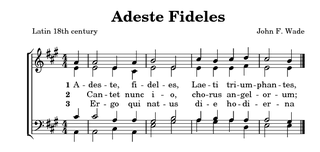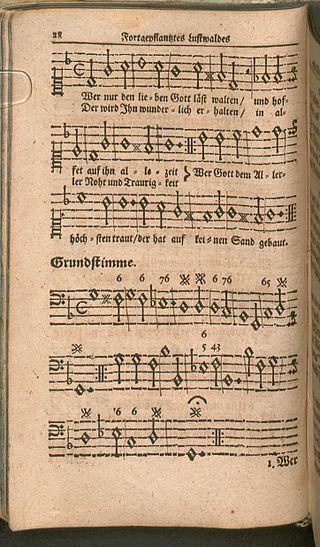
A hymnal or hymnary is a collection of hymns, usually in the form of a book, called a hymnbook. They are used in congregational singing. A hymnal may contain only hymn texts ; written melodies are extra, and more recently harmony parts have also been provided.

"Love Divine, All Loves Excelling" is a Christian hymn by Charles Wesley on Christian perfection. Judging by general repute, it is among Wesley's finest: "justly famous and beloved, better known than almost any other hymn of Charles Wesley." Judging by its distribution, it is also among his most successful: by the end of the 19th century, it is found in 15 of the 17 hymn books consulted by the authors of Lyric Studies. On a larger scale, it is found almost universally in general collections of the past century, including not only Methodist and Anglican hymn books and commercial and ecumenical collections, but also hymnals published by Reformed, Presbyterian, Baptist, Brethren, Seventh-day Adventist, Lutheran, Congregationalist, Pentecostal, and Roman Catholic traditions, among others including the Churches of Christ. Specifically, it appears in 1,328 of the North American hymnals indexed by the online Dictionary of North American Hymnology, comparable to Newton's "Amazing Grace" (1,036), Wesley's "O for a Thousand Tongues" (1,249), and Watts' "When I Survey the Wondrous Cross" (1,483), though still well short of Toplady's "Rock of Ages" (2,139) or Wesley's own "Jesu, Lover of my Soul" (2,164).

A metrical psalter is a kind of Bible translation: a book containing a verse translation of all or part of the Book of Psalms in vernacular poetry, meant to be sung as hymns in a church. Some metrical psalters include melodies or harmonisations. The composition of metrical psalters was a large enterprise of the Protestant Reformation, especially in its Calvinist manifestation.
Songs of Syon: A Collection of Hymns and Sacred Poems Mostly Translated from Ancient Greek, Latin and German Sources was produced by George Ratcliffe Woodward in 1904. In 1908, a new and enlarged edition was produced, with the title Songs of Syon: A Collection of Psalms, Hymns and Spiritual Songs for Public and Private Use. While the first edition had 201 items, this later edition had 431. Words and music were published separately. A third edition followed in 1910. A fourth edition, revised and enlarged, came out in 1923. This was primarily a reprint of the third edition, with musical errors corrected on the advice of Dr.Charles Wood. In a few cases, "finer melodies, or better harmonies, have been substituted." The hymnal was described by the writer of Woodward's Church Times obituary as "the finest hymn book, both as regards words and music, ever produced in England."
Hymns are an important part of the history and worship of the Church of Jesus Christ of Latter-day Saints.

Hymns of the Church of Jesus Christ of Latter-day Saints is the official hymnal of the Church of Jesus Christ of Latter-day Saints . Published in English in 1985, and later in many other languages, it is used throughout the LDS Church. This article refers to the English version. The book was published on the 150th anniversary of the publication of the first LDS hymnbook, compiled by Emma Smith in 1835. Previous hymnbooks used by the church include The Manchester Hymnal (1840), The Psalmody (1889), Songs of Zion (1908), Hymns (1927), and Hymns (1948).

"Onward, Christian Soldiers" is a 19th-century English hymn. The words were written by Sabine Baring-Gould in 1865, and the music was composed by Arthur Sullivan in 1871. Sullivan named the tune "St Gertrude," after the wife of his friend Ernest Clay Ker Seymer, at whose country home he composed the tune. The Salvation Army adopted the hymn as its favoured processional. The piece became Sullivan's most popular hymn. The hymn's theme is taken from references in the New Testament to the Christian being a soldier for Christ, for example II Timothy 2:3 (KJV): "Thou therefore endure hardness, as a good soldier of Jesus Christ."

The Jubilate Group is a Christian publishing house that administers copyright for more than sixty composers and writers. The group was founded by Michael Baughen in the 1960s. The group's first production was Youth Praise. In 1982, Jubilate published Hymns for Today's Church, one of the first hymn books with completely modernised language. In 1999, Sing Glory, Jubilate's most recent major hymn book, was published.
"Fairest Lord Jesus", also known as "Beautiful Savior", is a Christian hymn.

A hymn tune is the melody of a musical composition to which a hymn text is sung. Musically speaking, a hymn is generally understood to have four-part harmony, a fast harmonic rhythm, with or without refrain or chorus.

"Praise to the Lord, the Almighty" is a Christian hymn based on Joachim Neander's German-language hymn "Lobe den Herren, den mächtigen König der Ehren", published in 1680. John Julian in his A Dictionary of Hymnology calls the German original "a magnificent hymn of praise to God, perhaps the finest creation of its author, and of the first rank in its class."

"Ach Gott, vom Himmel sieh darein" is a Lutheran chorale of 1524, with words written by Martin Luther paraphrasing Psalm 12. It was published as one of eight songs in 1524 in the first Lutheran hymnal, the Achtliederbuch, which contained four songs by Luther, three by Speratus, and one by Justus Jonas. It was contained in 1524 in the Erfurt Enchiridion. It is part of many hymnals, also in translations. The text inspired vocal and organ music by composers such as Heinrich Schütz, who set it as part of his Becker Psalter, and Johann Sebastian Bach, who based a chorale cantata on it. Mozart used one of its tunes in his opera The Magic Flute.

"Wer nur den lieben Gott läßt walten" is a 1641 hymn by Georg Neumark, who also composed the melody for it. It has seven verses and deals with the Christian putting their trust in God. Its author referred to it as a "Trostlied" or song of consolation and it first appeared in his Fortgepflantzer musikalisch-poetischer Lustwald. It also appeared in Johann Crüger's 1672 Praxis pietatis melica and in the first part of Johann Anastasius Freylinghausen's 1704 Geistreiches Gesangbuch. It has inspired musical settings, and is part of current German hymnals, both Protestant and Catholic.

"Herr Christ, der einig Gotts Sohn" is a Lutheran hymn by Elisabeth Cruciger. Printed in 1524 in the Erfurt Enchiridion, together with 18 hymns by Martin Luther, it is one of the oldest Lutheran hymns. The text combines Lutheran teaching with medieval mysticism. It has been the basis of musical settings such as Bach's chorale cantata Herr Christ, der einge Gottessohn, BWV 96.

"Praise, my soul, the King of heaven" is a Christian hymn. Its text, which draws from Psalm 103, was written by Anglican divine Henry Francis Lyte. First published in 1834, it endures in modern hymnals to a setting written by John Goss in 1868, and remains one of the most popular hymns in English-speaking denominations.
Hymnody in continental Europe developed from early liturgical music, especially Gregorian chant. Music became more complicated as embellishments and variations were added, along with influences from secular music. Although vernacular leisen and vernacular or mixed-language carols were sung in the Middle Ages, more vernacular hymnody emerged during the Protestant Reformation, although ecclesiastical Latin continued to be used after the Reformation. Since then, developments have shifted between isorhythmic, homorhythmic, and more rounded musical forms with some lilting. Theological underpinnings influenced the narrative point of view used, with Pietism especially encouraging the use of the first person singular. In the last several centuries, many songs from Evangelicalism have been translated from English into German.

The Yattendon Hymnal was a small but influential hymnal compiled by Robert Bridges and H. Ellis Wooldridge assisted by Monica Bridges for the Church of England parish church at Yattendon, Berkshire, England where Monica's family lived. Totalling 100 items, it first appeared in four separate parts from 1894, culminating in a single, combined version in 1899. That same year Bridges also published the accompanying A practical discourse on some principles of hymn-singing.

In Our Day of Thanksgiving is a Christian hymn written in 1894 by the English hymnodist William Henry Draper. It was first published in The Victoria Book of Hymns in 1897, and appears in a number of current hymnbooks. The text of the hymn is about remembrance of the dead and is often sung on All Saints' Day or All Souls' Day, or for the dedication of a church.














